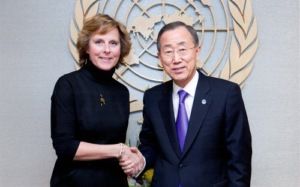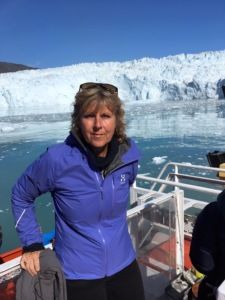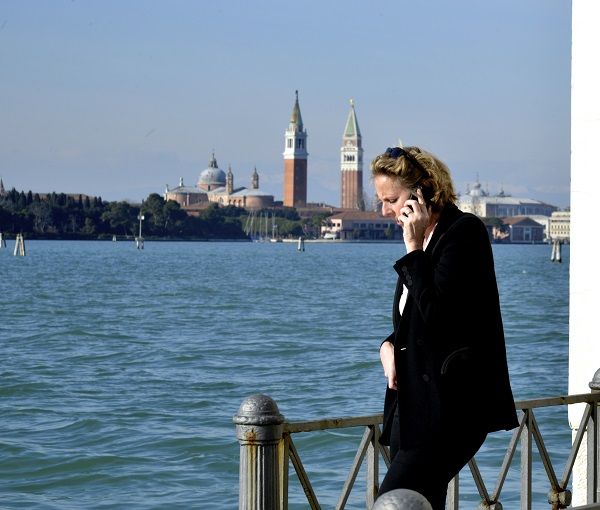As Climate and Energy Minister of Denmark she literally made it to the top. Connie Hedegaard cajoled her fellow ministers into strapping on their crampons to hike up the Perito Moreno Glacier in Argentina. The aim of the exercise: to show them first-hand the effects of climate change and to push for massive action.
Now, about ten years and ten COPs later, Hedegaard is still in the forefront when it comes to agitating for climate action. Indeed, Hedegaard has managed to convert some of her biggest adversaries into allies. Her resolute leadership and unconventional diplomatic methods would even make Machiavelli, the most famous of all state diplomats, salute.
Diplomacy Magazine talked to Hedegaard at the Alcantara Symposium on Sustainability in Venice in order to learn more about her strategy.
Turning over a new leaf
“We cannot just talk to the good guys,” Hedegaard explained. In September 2016 she joined the Sustainability Council of Volkswagen.
“After the diesel car emissions scandal, if there was any car manufacturer in the world that had to demonstrate change, it would be Volkswagen.”
At first accused of green washing, in December Volkswagen stunned the world with a major announcement.
“The CEO announced that Volkswagen would spend up to 44 billion euros on electrification. This is not peanuts. This is huge. This is really changing the company.”

But for Hedegaard and Georg Kell, the founder of the UN Global Compact who chairs the Volkswagen Sustainability Council, this is not enough.
“The next big step is the transformation from merely being a car manufacturer into being a company that delivers mobility service,” Hedegaard explained.
“I think Georg Kell agrees. They are really changing.”
A lobbyist’s nightmare
During her mandate as European Commissioner for Climate, the aggressive lobbying of the auto industry caused nightmares for climate activists. For decades car manufacturers have tried to sabotage stricter laws for CO2 emissions and new technologies.
“They always stood united and said: don’t give us strict climate regulations,” Hedegaard recalled. Volkswagen, the world’s biggest car producer, is now turning its fleet around. “Ideas and technology drive mankind,” observed UN Global Compact founder Georg Kell during the Alcantara Symposium.
“Responsible companies are better equipped for the future. High sustainable performers are outperforming polluters,” he added.
Together with Hedegaard, Kell and the top management ignited the ‘electric-revolution’ at Volkswagen, which is now impacting the global car industry.
Political change also needed
Climate change is social change, so Hedegaard invests a lot of time and resources into chairing the KR foundation and CONCITO, Denmark’s biggest green think-tank.
“More and more people are starting to realise that they can change their energy systems by using wind and solar power,” she continued.
“But if Denmark wants to reach zero emissions by 2050 and wants to fulfil the UN’s SDGs, we also have to transform the transportation sector, agriculture, our buildings and the way we plan our cities. Politics has to include all of theses areas.”

Hedegaard is upbeat when it comes to the young generation: “The green student movement is calling for real change. They are holding politicians accountable.”
To be resolute and outspoken is her trademark. “The time has come for a bit more ‘naming and shaming’. We should not be afraid to say something positive to companies and nations that do the right thing. But we also should be more direct with those who are not acting responsibly.”
Green shoots spotted
Hedegaard is proud that Denmark is one of the greenest nations. “In our upcoming elections before June, climate is at the top of the agenda,” she pointed out.
What worries her is increasing populism and xenophobia. “People feel insecure about globalisation and feel overwhelmed by immigration and increasing inequalities. Politician are not living in a vacuum. If we want them to think in the long term, it is important that they get signals from the electorate.”
She has also observed major green shifts in the financial sector. “As part of their risk assessments we can see that pension funds and big financial institutions are starting to change their portfolios. We can see that there are more and more responsible investors. As money makes the world go round, this is not a small thing. This is a big thing.”
When the conversation turned to how to deal with Trump, Hedegaard retorted: “Do you have any good advice?”
Still an optimist
However, she remains optimistic that many citizens, organisations and regional governments in the US are increasing their action on climate issues in order to demonstrate that they are still in line with the Paris Climate Agreement.
With two decades of experience in international and domestic executive policy making, Hedegaard is one of the most outspoken and best connected advocates of a low-carbon and green economy.
Time magazine named her as one of the rare personalities who most affect the world and do the impossible. What is her secret formula for successful politics?
“The art of politics is to push interests a bit more that they want to be pushed, but of course, you should not push them so much that they go out of business,” she said.















